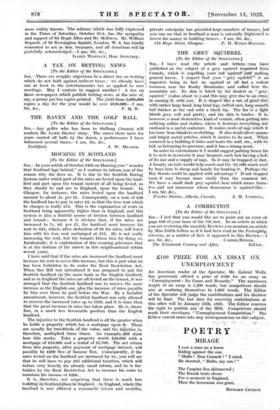HOUSING IN SCOTLAND
[To the Editor of the SPECTATOR.] SIR,--In your article of October 24th on Housing you "wonder that Scotland lags behind," so I venture to inform you of the reason why she does so. It is due to the Scottish Rating System under which part of the rates are levied upon the land- lord and part upon the tenant instead of all being levied, as they should be and are in England, upon the tenant. In Glasgow, for instance, the rites levied Upon the landlord amount to about 5s. per £1. Consequently, on a rent of £20 the landlord has to pay in rates £5, so that the true rent which he charges is really 115. This is the explanation of rents in Scotland being apparently higher than in England, and this system is also a fruitful source of friction between landlord and tenant ; because it is obvious that, if the rates are increased to 7s. 6d. per 11, the landlord must increase his rent to £24, which; after deduction of £9 for rates, .will leave him with his true rent unchanged at £15. He is not really increasing the rent, but the tenants blame him for doing so. Incidentally, it is exploitation of this seeming grievance that is at the bottom Of the unrest in this neighbourhOod within recent years.
I have said that if the rates are increased the landlord must increase his rent to "Cover this increase, but this is just what he has been forbidden to do under the Rent Restriction Act.. When this Bill Wis. introduced it was proposed to put the Scottish landlord dn'the smile .baSis as the English 'landlord; and as in England Ihe-rates are all levied on the tenant, it was arranged that the Scottish landlord was to receive the smile increase as the English one, plus the increase of rates payable by him over those -he paid- before the War. By a Socialist amendment, however, the Scottish landlord was only allowed to recover the increased rates up to 1920, and it is since then that the great increase in rates has taken place. He is, there- fore, in a much less favourable position than the English landlord.
The injustice to. the.Seottish landlml, is all, the greater when he holds a property: which:has a mortgage upon--it These
are usually for tv7O4hirds -Ot the value, and theinjUstice therefore, multiplied: three .tiraeS. An- exa.papli1A sltOw how this .w_orks, Take _a property worth 120,000 with a mortgage of- £-18,000 and a rental of £1,709. The net return from this property, after payment of mortgage interest, will possibly be 1200 free- of Income Tax. Consequently, if the rates levied -on the landlord are increased by is., you will see that he will have to pay E85 additional taxation, which will reduce very heavily his already small return, and he is for- bidden by the Rent Restriction Act to increase his rents to znaintain.his income of £200.
It is, Aberefore, not surprising :that there is much less buikling3i0ScotlandAthau1n- Engleudz _-_11iVaglan;_&:vilwre:the landlord is now allowed a reasonable -return and security,
private enterprise has provided large-numbers of hoysesdnit you can see that in Scotland a-nian is naturally frightened to invest his money in building houses.—I am, Sir, &c.,


























































 Previous page
Previous page